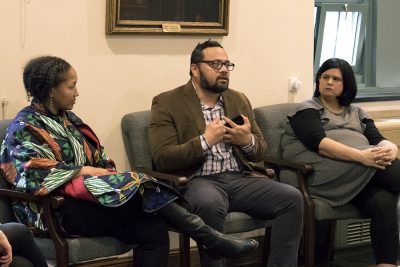
Conversations about environmentalism, climate change and conservation swirled around during Earth Week last week, and some are calling on activists and environmentalists to pay more attention to groups that are affected by climate change, yet often left out of green efforts.
On Thursday, Marsh Chapel and the School of Theology’s THecology club, an organization that combines spiritual disciplines with activism and ecological justice, held a panel discussion entitled “Is It Bougie To Be Green? The Gentrification of the Eco Movement” to help address and include those groups.
At the talk, three panelists explored how socioeconomic differences interact with faith through the lens of climate change.
“There are so many standard narratives that are pushed when it comes to climate change,” said Jennifer Bloesch, a senior in STH who helped to organize the event. “We wanted to try something different and spark some different conversation.”
Panelists Alicia Vélez Stewart, Pausa Kaio Thompson and the Rev. Mariama White-Hammond all have ties to the STH — Thompson and Stewart are graduate students in STH, with Thompson studying religious studies and Stewart seeking a Master’s of Divinity. White-Hammond graduated from STH in 2017 with a Master’s of Divinity.
White-Hammond, the associate minister for ecological justice at the Bethel African Methodist Episcopal Church in Boston, said she believes that the Earth and faith have a distinct connection, so climate change is a religious issue as well.
“People need opportunities to connect with nature,” she said. “For me, it’s a reminder that the whole Earth is God’s house. Would you like it if someone came into your house and started renovating?”
The speakers pointed out another social concern: that those who will likely be most affected by climate change are marginalized communities, who are already at risk.
“[Climate change has] become an existential crisis, particularly for poor people,” Thompson said. “People are fighting for their very existence in places that contribute the least to climate change itself.”
The speakers prioritized debunking the stereotype that people of color don’t care about environmental issues. Stewart said it’s not so much that people don’t care, but more so that they have to care about many things at once.
“In a lot of cases, there are layers of injustice that pile up on one another and interact,” Stewart said. “There’s a poverty tax on people — it can be hard for people who are living in urban poor situations, in particular, to do things like reduce their carbon footprint.”
According to White-Hammond, many misconceptions stem from a lack of accessibility in environmental activist circles.
“The big question is who has time, retirement, work flexibility and freedom,” White-Hammond said. “People say, ‘I don’t understand why people of color don’t come to my meetings,’ and to that I say, ‘You hold your meetings at 1 p.m. on weekdays.’ Not everyone in my community can make it to something like that.”
White-Hammond also addressed challenges affecting specific communities, like the issue of blindness.
“I sometimes feel like people care more about that bird they saw in a picture than they care about my cousin, who is struggling to make it day-to-day,” White-Hammond said. “There are issues that get brought up that a lot of white activists don’t even consider. For instance, in the case of a disaster, what happens to people who are incarcerated? Do they have a plan?”
Intersectionality could play an important role in bridging the gap, Thompson said.
“People forget that climate change really started for native people in 1492,” said Thompson, who is American-Samoan. “All of these things are connected. Climate change often is partially environmental racism, and people miss that connection.”
White-Hammond said she wants to challenge activists to see climate change as a symptom of a larger problem as opposed to something separate.
“When I talk about this with my church, I talk about how this is a system that doesn’t work, and climate change is showing that it can’t work,” she said. “[Climate change] goes a lot deeper than just carbons, and sometimes the traditional environmental movement isn’t willing to ask those hard questions.”
Victoria Seremetis, a sophomore in College of Arts and Sciences, said they appreciated the alternative angle on environmentalism.
“These are the kind of conversations that I’ve been wanting to have, but there aren’t always places to have them,” Seremetis said. “I’m glad that people are bringing this up.”
Through honest communication between religious and socioeconomic groups, Thompson said he is hopeful that difficult conversations can be further addressed.
“Discomfort is inevitable, but sometimes it can be fertile ground for change,” Thompson said. “We’re all saying the same thing, [but] we’re just saying it in different ways. If we put our worldviews and priorities together, we might get something.”
















































































































